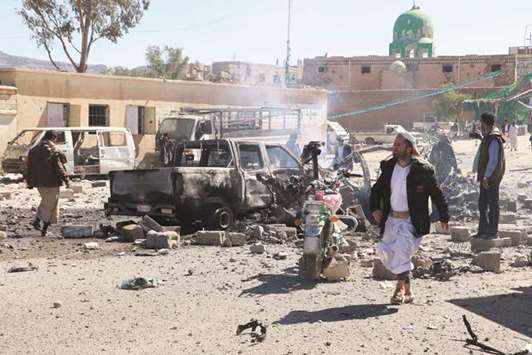The Saudi-led coalition carried out a string of air raids yesterday in Yemen, killing 11 civilians in the Houthi stronghold of Saada a day after the rebels fired a missile at Riyadh, a tribal chief and witnesses said.
On the ground, unidentified assailants attacked Houthis guarding the Sanaa residence of former president Ali Abdullah Saleh, who was killed by the rebels earlier this month.
An unspecified number of Houthi guards died in the attack, residents said.
The tribal chief said that 11 civilians were killed and eight others wounded in an air strike on the Houthi rebel stronghold of Saada in northern Yemen.
The pro-Houthi television channel Al-Masirah gave the same death toll and added that women and children were among those killed, while 19 people were wounded.
Witnesses and a security sources said other coalition air raids targeted a rebel camp south of Sanaa and a second camp to the west.
The rebel-run Saba press agency said 38 people, including women and children, were killed or wounded in raids targeting different parts of Yemen. The raids followed a missile attack by the Houthi rebels on Tuesday against the Saudi capital. Saudi Arabia said it “intercepted and destroyed” the missile.
The Houthis said “the target of the ballistic missile was a large gathering of Saudi regime leaders in Yamamah Palace”, where King Salman — hours later — unveiled the country’s 2018 budget.
Yemen is in the midst of a bloody war between the Houthis and pro-government forces, who were expelled from Sanaa in September 2014.
Rebel chief Abdelmalik al-Huthi said Tuesday’s attack was timed to coincide with the 1,000th day of the Saudi-led intervention in Yemen’s conflict. It was the second ballistic missile to target the heart of Riyadh in less than two months. The first failed attempt on November 4 triggered a sharp Saudi response — the full closure of Yemen’s ports and borders that were already under an extensive blockade.
At the time, the UN aid chief warned that the siege — namely on the key rebel-held port of Hodeida — could trigger the worst famine the world has seen in decades.
The blockade was partially lifted three weeks later amid massive international pressure. The coalition issued a statement yesterday saying it would not resort to closing Hodeida port.
“The coalition leadership announces the port of Hodeida will remain open for humanitarian and relief supplies and the entry of commercial vessels, including fuel and food vessels, for a period of 30 days,” said the statement, carried on the state-run Saudi Press Agency.

People inspect damage at the site of air strikes in the northwestern city of Saada, Yemen, yesterday.


